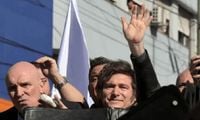Argentinian President Javier Milei found himself at the center of chaos on Wednesday evening, August 27, 2025, after his campaign rally in Lomas de Zamora, a district just 20 kilometers south of Buenos Aires, descended into violence. What began as a routine show of support for the libertarian leader quickly spiraled into pandemonium as protesters hurled stones, bottles, and even plants at Milei’s convoy, forcing security teams to cut the event short and rush the president and his entourage to safety.
Milei, who has been campaigning hard ahead of October’s midterm elections, was riding in the back of a pickup truck alongside his sister and chief of staff, Karina Milei, and other senior officials. According to eyewitness accounts reported by BBC and Israel Hayom, the atmosphere shifted dramatically as Milei’s caravan advanced through the streets of Lomas de Zamora—a historic stronghold of the Peronist opposition. Supporters’ cheers gave way to angry shouts of “Out with Milei!” and a barrage of projectiles.
Security agents leapt into action, pulling Milei and his advisors from the back of the truck and hustling them into a secure vehicle. The scene was so frantic that Congressman José Luis Espert was spotted fleeing the area on a motorcycle—without a helmet, no less, as noted by Israel Hayom. The event, which was meant to bolster Milei’s public image and rally support ahead of key elections, ended abruptly.
Presidential spokesman Manuel Adorni confirmed that Milei was unharmed. "President Milei escaped uninjured," Adorni stated, a sentiment echoed by BBC and France24. Karina Milei and other officials were also unharmed, though the chaos left at least one female supporter with broken ribs, requiring hospitalization. Local police had to intervene to restore order as violent clashes erupted between Milei’s supporters and detractors, a detail corroborated by multiple outlets including France24 and BBC.
In the aftermath, blame for the attack became a political football. Milei himself took to social media, posting a photo of a rock and declaring, “Civilization or barbarism, never again Kirchnerism. The end.” He directly accused followers of his political opponent, former President Cristina Fernández de Kirchner, of orchestrating the violence. Security Minister Patricia Bullrich echoed this sentiment, alleging that Kirchner’s faction had “coordinated an assault on the president while jeopardizing the citizens and households who arrived to support him.” Adorni went further, describing the protesters as “militants from outdated politics” with “a primitive violence pattern from bygone eras.”
Kirchner, who was found guilty of corruption in June and is currently under home confinement, remains a towering figure in Argentina’s opposition. Despite her official exclusion from politics, she is still regarded as the most powerful voice against Milei’s administration, according to Israel Hayom. The Lomas de Zamora district itself is a bastion of Peronist support, making it a particularly charged setting for Milei’s campaign appearance.
The timing of the attack could hardly be more sensitive. The incident came just days before crucial provincial elections in Buenos Aires, slated for September 7, 2025, and less than two months ahead of the national midterms scheduled for October 26. These elections are seen as a referendum on Milei’s radical economic agenda and his efforts to expand his Liberty Advances party’s power in Congress, where it currently holds only a minority. As BBC reports, Milei is hoping to use the ballot box to fight off opposition attempts to block his sweeping spending cuts.
Since taking office in December 2023, Milei has embarked on a campaign of drastic state expenditure reductions, aiming to tackle Argentina’s chronic fiscal deficit and bring down runaway inflation. By most accounts, he has managed to significantly lower inflation levels—a feat that has earned him both praise and criticism. His tough fiscal policies have proved divisive, sparking both admiration among supporters and resentment among those hit hardest by budget cuts.
But the violence in Lomas de Zamora wasn’t the only controversy dogging Milei’s campaign. Just minutes before the attack, the president addressed a scandal involving leaked audio recordings from Diego Spagnuolo, the former head of the national disability agency. The tapes, which surfaced the previous week, allegedly reveal a kickback scheme in which funds intended for people with disabilities were diverted to Karina Milei and her consultant. The purported scheme made the agency’s service provision contingent upon payments to a pharmaceutical company, which then funneled a portion of the earnings to Milei’s family members. Following the leak, Spagnuolo, who had also served as Milei’s attorney, was dismissed from his post.
Critics have seized on the scandal, accusing Milei of hypocrisy and corruption—particularly damaging charges for a leader who won office on a wave of public outrage over entrenched graft in Argentina’s political class. As France24 notes, the controversy is especially sensitive given the president’s campaign promises to clean up government and root out corruption. For many Argentinians, the revelations have cast a shadow over Milei’s reformist credentials and fueled skepticism about his inner circle’s integrity.
The attack and subsequent blame game have only served to heighten tensions in an already polarized political climate. Supporters of Milei see the violence as evidence of the opposition’s desperation and willingness to resort to “primitive” tactics. Opponents, meanwhile, accuse the president of using the incident to deflect attention from his government’s scandals and unpopular policies.
In the broader context, the events in Lomas de Zamora reflect the deep divisions running through Argentine society. The clash between Milei’s libertarian vision and the Peronist legacy represented by Kirchner is playing out not just in Congress, but in the streets—sometimes literally, as Wednesday’s events made clear. With the provincial and national elections looming, the stakes are higher than ever, and both sides are digging in for what promises to be a bruising political battle.
As the dust settles, one thing is certain: Argentina’s political landscape remains as volatile as ever. Whether Milei’s bold reforms and combative style will secure him a stronger mandate or provoke further backlash is a question that only the coming weeks—and the voters—can answer.


